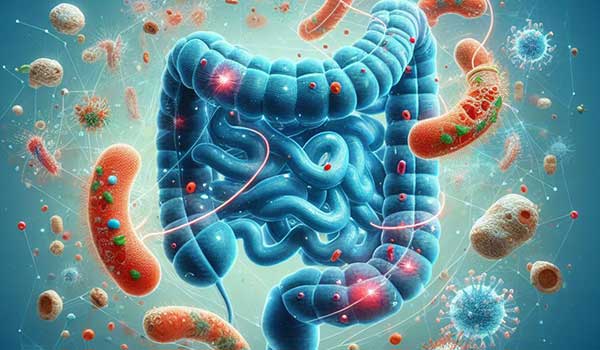Are you tired of dealing with bloating and gas after every meal? It’s time to consider incorporating probiotics into your routine. Probiotics are beneficial bacteria that can help improve your gut health, reduce inflammation, and alleviate digestive issues like bloating and gas.
However, with so many options available, how do you choose the best probiotic for your specific need’s this article, we will explore the different types of probiotics that can help alleviate bloating and gas.
Whether you prefer a supplement or a food source, we’ve got you covered. We will delve into the benefits of popular probiotic strains such as Lactobacillus and Bifidobacterium and discuss their effectiveness in relieving digestive discomfort.
But that’s not all – we will also provide you with tips on how to choose the right probiotic for you, including factors like strain diversity, potency, and packaging. With the guidance from this article, you can make an educated decision on which probiotic is best for your bloating and gas issues, giving you the relief you’ve been searching for.
Quick Summary
The best probiotic for bloating and gas is one containing strains like Lactobacillus and Bifidobacterium.
Understanding bloating and gas
Bloating and gas are common digestive issues that can cause discomfort and embarrassment. Bloating occurs when your stomach feels swollen or full, often accompanied by a tight or distended abdomen. On the other hand, gas refers to the air that builds up in your digestive system, leading to burping, flatulence, or a feeling of pressure.
These symptoms can be caused by various factors, including poor diet, food intolerances, certain medications, and underlying digestive disorders. When it comes to finding relief, probiotics have shown promise in addressing the root causes of bloating and gas.
What are probiotics?
Probiotics are live bacteria and yeasts that are good for your health, especially your digestive system. They are naturally found in your body and certain foods, but can also be taken as supplements. Probiotics help maintain a healthy balance of bacteria in your gut, promoting proper digestion and supporting your immune system.
There are many different strains of probiotics, but the most commonly studied ones include Lactobacillus and Bifidobacterium. These strains have been associated with various health benefits, including reducing bloating and gas.
How probiotics can help with bloating and gas
Probiotics work by restoring the natural balance of bacteria in your gut. When the balance is disrupted, harmful bacteria can multiply, leading to digestive issues like bloating and gas. By introducing beneficial bacteria through probiotics, you can help restore this balance and alleviate the symptoms.
Additionally, probiotics can help break down carbohydrates that are difficult to digest, reducing the amount of gas produced during digestion. They can also strengthen the gut barrier, preventing the leakage of toxins into the bloodstream, which can contribute to bloating and inflammation.
Different types of probiotics
Probiotics come in various forms, including capsules, tablets, powders, and even certain foods. The most common types of probiotics include Lactobacillus and Bifidobacterium strains.
Lactobacillus strains are found naturally in the digestive, urinary, and genital systems. They can help break down lactose, the sugar found in milk, which can be difficult for some people to digest. Lactobacillus strains have been studied for their ability to reduce bloating and gas in individuals with lactose intolerance.
Bifidobacterium strains are predominantly found in the large intestine. They are known to improve overall gut health and assist in the breakdown of dietary fiber. Studies have shown that Bifidobacterium strains can reduce bloating and gas in individuals with irritable bowel syndrome (IBS).
Research on probiotics for bloating and gas
Numerous studies have investigated the effectiveness of probiotics in alleviating bloating and gas. Overall, the results have been promising, showing that probiotics can provide relief for individuals suffering from these symptoms.
For example, a study published in the Journal of Clinical Gastroenterology found that a combination of Lactobacillus and Bifidobacterium strains significantly reduced bloating and gas in individuals with IBS. Another study published in the European Journal of Gastroenterology & Hepatology showed that a specific strain of Lactobacillus acidophilus reduced bloating and flatulence in individuals with functional constipation.
While the research is still ongoing, these studies suggest that probiotics can be a valuable tool in managing bloating and gas.
Choosing the best probiotic for bloating and gas
When it comes to choosing the best probiotic for your bloating and gas issues, there are a few factors to consider.
Firstly, strain diversity is important. Look for a probiotic supplement or food source that contains a variety of strains, as different strains may have different benefits for your gut health.
Secondly, potency matters. Check the number of live bacteria or colony-forming units (CFUs) in each serving. Higher CFUs indicate a more potent probiotic, which may be more effective in relieving bloating and gas.
Lastly, pay attention to the packaging. Probiotics are sensitive to heat and moisture, so choose a product that is properly sealed and stored in a cool, dry place to ensure the viability of the bacteria.
Prebiotics and their role in reducing bloating and gas
In addition to probiotics, prebiotics can also play a role in reducing bloating and gas. Prebiotics are a type of fiber that nourishes the beneficial bacteria in your gut. They serve as food for probiotics, helping them thrive and multiply.
Foods rich in prebiotics include garlic, onions, leeks, bananas, and asparagus. By incorporating these foods into your diet, you can support the growth of beneficial bacteria and potentially reduce bloating and gas.
Incorporating probiotics into your diet
There are several ways to incorporate probiotics into your diet. One option is to take a probiotic supplement, which can provide a concentrated dose of beneficial bacteria. Look for a supplement that contains the strains mentioned earlier, such as Lactobacillus and Bifidobacterium.
Alternatively, you can consume probiotics through fermented foods. Yogurt, sauerkraut, kimchi, kefir, and kombucha are all rich sources of probiotics. Including these foods in your diet can not only improve your gut health but also add variety and flavor to your meals.
Other natural remedies for bloating and gas
While probiotics can be effective in reducing bloating and gas, it’s worth exploring other natural remedies as well. For instance, peppermint oil has been shown to relax the muscles of the gastrointestinal tract, reducing bloating and cramping. Ginger, chamomile tea, and fennel seeds are also known for their soothing properties on the digestive system.
Additionally, lifestyle factors like regular exercise, stress management, and a healthy diet can contribute to better digestion and reduced bloating and gas.
Conclusion
If you’re struggling with bloating and gas, incorporating probiotics into your routine may provide the relief you’ve been searching for. Understanding the different types of probiotics, their benefits, and the research supporting their use can help you make an informed decision on which probiotic is best for your specific needs.
Remember to consider factors like strain diversity, potency, and packaging when choosing a probiotic supplement or food source. Don’t forget about prebiotics either, as they can support the growth of beneficial bacteria in your gut.
By incorporating probiotics into your diet and exploring other natural remedies, you can take control of your digestive health and say goodbye to bloating and gas once and for all. So why wait? Start your journey towards a happier, healthier gut today.



